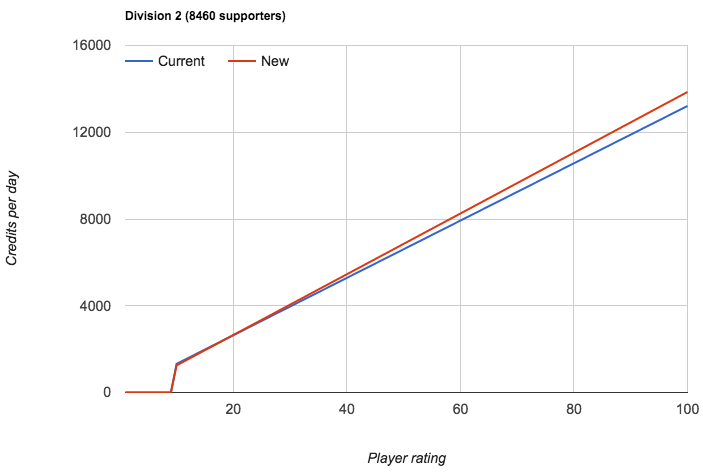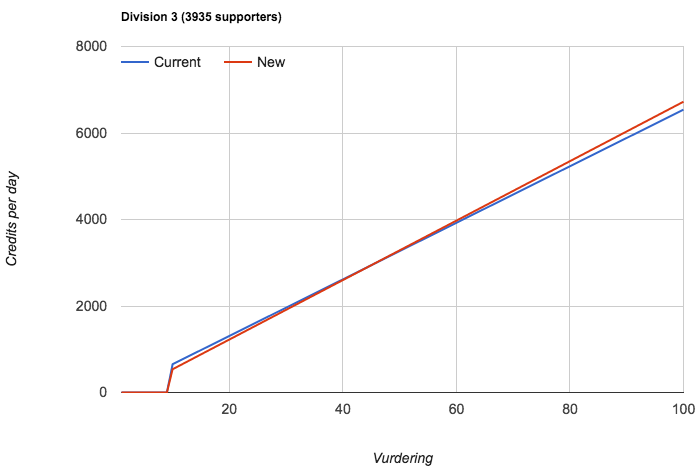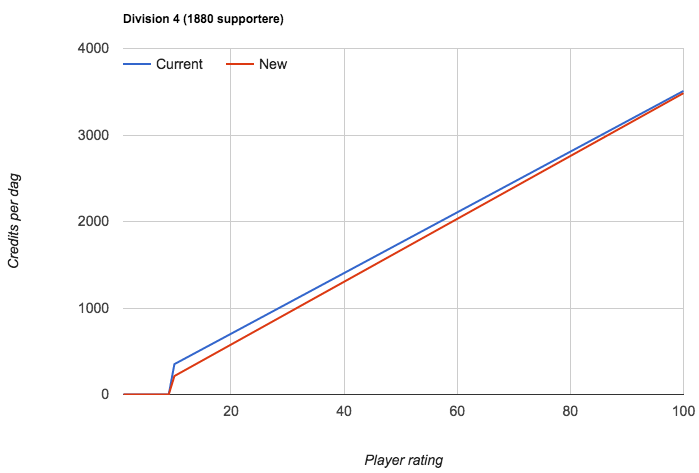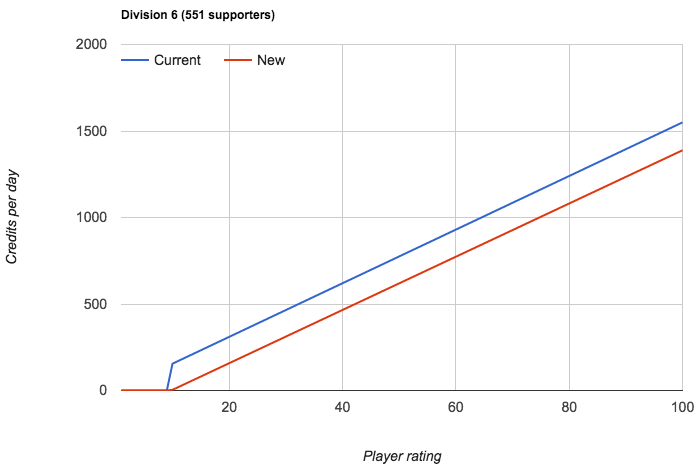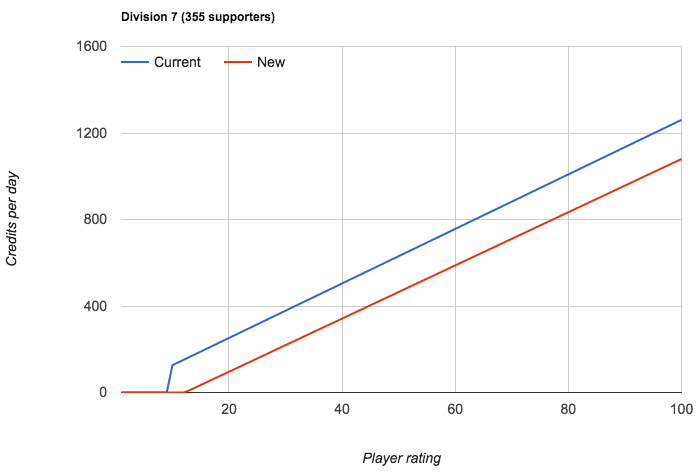
Rebalance: Economy
The next step in Project Rebalance is to improve certain parts of the clubs' economy. Overall, the goal is to avoid the situation where clubs on their way up the ladder, encounter large, sudden increases in difficult and decreases in revenues, which can make it feel like you're stagnating.
In addition, it is also about anticipation and reacting to some of the economic impact that the other changes in Project Rebalance will have.
League prizes + TV revenue
To begin with, we've take a look at the size and distribution of league prizes.
Currently, it may be problematic being promoted to a higher division, because it can have negative consequences for your finances - and we'd rather avoid that.
As an example, we can take a look at how much you get out of remaining in 3rd place for 2 weeks, compared coming in second place, then moving up and only achieving 16th place the following week.
If we use division 3 and 2 in the Danish league as an example, the calculation looks like this:
If you remain in 3rd place, for consecutive weeks:
2x 3rd prize in third division = 166,667 + 166,667 = 333,334 Credits
If you achieve 2nd place in the third division one week and subsequently end up in 9th through 16th in the second division the following week:
1x 1st prize in the 2nd division + 0 prize money for 9th-16th place = 222,222 Credits
In this instance you lose 111,112 Credits when you move up, unless you are able to end up as high as 8th place in your new division.
Of course, you recoup some of the lost revenue by the higher attendance you get when playing games against opponents with higher VIFA rank and thus more supporters.
To improve the situation, we will implement these measures:
- There will be prizes for 9th to 12th place.
- We will introduce TV revenue which is awarded to everyone, depending on the number of TV viewers watching their matches.
- The sum of prizes and TV revenue will be higher than today's prize money for all divisions except 1st.
Today, the total prize money for the Danish divisions is as follows:
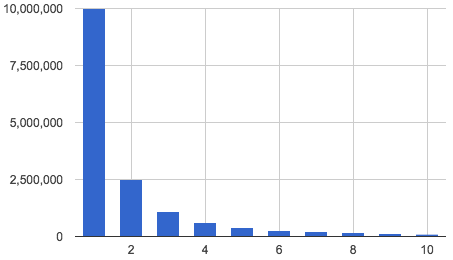
The size of TV revenue will depend on the participating clubs' supporters, and is not fixed per division. Therefore we ran a simulation to find out how much TV revenue, the clubs in the different divisions can expect if we apply the calculation to the average supporter numbers we see in the different divisions today.
Then, we came up with a new distribution of prizes and TV revenue.
Current New
prize money prize money TV revenue Total
Division 1: 10,000,000 7,500,000 2,558,614 10,058,614
Division 2: 2,500,000 3,000,000 1,123,250 4,123,250
Division 3: 1,111,111 1,200,000 557,842 1,757,842
Division 4: 625,000 650,000 257,242 907,242
Division 5: 400,000 400,000 119,909 519,909
Division 6: 277,777 275,000 59,443 324,443
Division 7: 204,081 210,000 39,125 249,125
Division 8: 156,250 175,000 23,160 198,160
Division 9: 123,456 130,000 20,000 150,000
Division 10: 100,000 100,000 20,000 120,000
Graphically, it'll look like this:
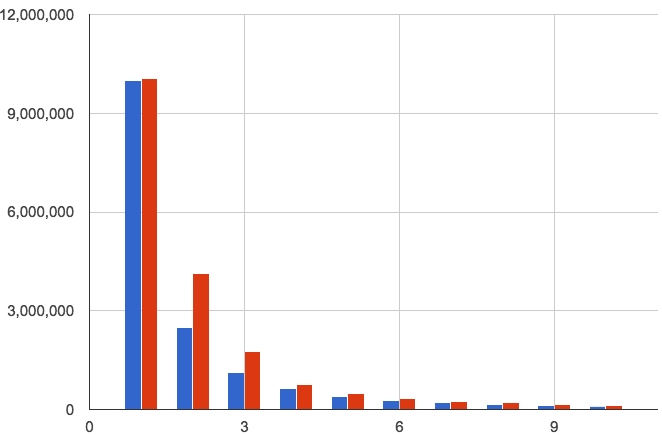
The blue bars show the current prize money pool, and the red bars are the sum of the new prize pools + TV revenue.
The distribution of prizes to the league placements will look like this:
1st place: 20.0% 2nd place: 15.0% 3rd place: 9.0% 4th place: 8.5% 5th place: 8.0% 6th place: 7.5% 7th place: 7.0% 8th place: 6.0% 9th place: 5.5% 10th place: 5.0% 11th place: 4.5% 12th place: 4.0%
For the relegators - 13th to 16th place - there are no prizes, but they will still receive TV revenues.
If we go back and look at the calculation that showed how much you lose by achieving 2nd place, advancing, and then ending in 16th place - in comparison to remaining in 3rd place for two weeks, it looks like this in the new system:
2nd division -> 1st division: -36,829 Credits 3rd division -> 2nd division: -19,418 Credits 4th division -> 3rd division: -8,519 Credits 5th division -> 4th division: -7,473 Credits 6th division -> 5th division: -6,026 Credits 7th division -> 6th division: -5,699 Credits 8th division -> 7th division: -4,674 Credits 9th division -> 8th division: -3,900 Credits 10th division -> 9th division: -3,000 Credits
The figures are based on the new prize amounts and our estimation of TV revenue based on current supporter numbers.
Notice that deficit from moving from third to second division and coming in 16th place, has been reduced from 111,112 Credits to only 19,418 Credits. When the deficit is this small, you should be able to recoup it by way of the increased entrance fees from playing in the higher division.
In addition, you will only have to achieve 12th place in you new division, in order for the sum of league prize + TV revenue to be profitable in itself.
The fact that there is still a small deficit in prizes / TV money if you move up and then relegate immediately, should be seen in light of the fact that there should still be a reason to really put up a fight in order to avoid relegation. Advancing should be the kick up the backside, which makes you optimize your squad, stadium, tactics etc.
Incidentally, TV revenue is also awarded for cup games. This means that it'll always be worthwhile participating in a cup, even if you meet a strong team on your first match and get knocked out immediately.
More information for managers
When some managers feel that it is not worthwhile to advance, it can be partly due to the fact that they don't receive enough information about their income.
We know from experience that many managers don't actually know that they get prizes for their league placements. It happens because we currently only send a notification about your prize during the season update if you come in the Top 3 in the league. We will change this, such that everyone who receives a prize gets a notification. In addition, you will also be informed of the TV revenue, which will be awarded at the end of the season.
The increased entrance fees you get by playing against more difficult opponents, can also be difficult to anticipate and respond to. Therefore, we will add information on the match preview, which will show the estimated attendance, entrance fees and TV revenue for that match.
Setting ticket fees per game
So that you can more easily take advantage of the increased spectator numbers when you move up, in the future, you will also be able to set the ticket prices separately per game. The setting will appear on the match previews, and when changing the ticket prices, you will see an updated estimation of attendance and revenue straight away.
Minimum supporter numbers
At the low end of VIFA rankings, we have increased the number of supporters by a small amount. This is most relevant to previous managers, who return to the game after a long break. They will be able to get up and running a bit quicker. As you know, newly started clubs take over a bot club which will have already been active in leagues and therefore they already have a decent number of supporters.
Difficulty for individual groups
The difficulty rating of the different countries influences the size of league prizes.
Difficulty is a number that is calculated weekly and is based on the average of player abilities in the top 3 divisions of each country.
For example, the difficulty of Denmark is 100 this week, and for Germany it is 86.
This means that the leagues in Denmark get the full prize money, as described above, and that the German leagues only get 86%.
Some time ago, we improved calculation of difficulty ratings. We fixed an old bug, and changed the calculation to take the 3 top divisions into account, instead of just the first division.
It is still a problem that all prizes in an entire country is determined by the average of the top 3 divisions. Within the same division there can easily be large differences in the strengths of opponents in the different groups, even though all groups get the same prizes.
Therefore, each group will have its own individual difficulty rating, which is based on a comparison of the group's own clubs compared to the average of all other clubs in the same division, across all countries.
Compensation for absent opponent
Occasionally, you will meet an opponent who does not have enough players to field a team. In this case, you win 3-0 automatically, but you won't get any entrance fees.
To remove this irritation, in these cases we will provide compensation equal to your average attendance fees.
Obviously, you'll only be compensated if the match was to be played on your own stadium. The club that couldn't field team will of course not receive any compensation.
Adjusting player wages
The players' wage demands are based on 3 factors:
- The player's rating
- The player's greed (a hidden number, which changes a bit every time you renew their contract)
- Your club's supporter-numbers
The rebalance will cause changes in the distribution of players. At the lower end we will see more medium-to-fair players, and at the high end the new rules for XP and age-related decline mean that at any given time will be fewer players with the highest ratings. These things will have an impact on clubs' finances, because player wage demands are based on their rating.
At the low end, even today clubs find it difficult to pay the salaries of some of the best players among those currently available on free transfer. This problem will grow in the future when the worst players get a small boost.
At the top, fewer players with ratings of 90 will exist at a time because players will start to decline as they grow old. This will mean that the salary costs of the top clubs will fall, even though they will still possess the best players in the game.
Therefore, we will adjust players' salaries in such a was as to meet following two objectives:
- The poorer players around 10-30 rating should require less pay for most clubs.
- The best players around 90 rating should, in the top clubs, demand the same salary as a player with 100 rating does today.
Since the salary demands are based on many factors, it is difficult to fully visualize the changes. To make it more manageable, I calculated the average of the players' greed and the average number of supporters for clubs in divisions 1 through 7. We will use these averages as the basis of a few examples.
Here are the average supporter numbers of clubs in divisions from 1st to 7th:
Avg.
Div. Supporters
1 18595
2 8460
3 3935
4 1880
5 1024
6 551
7 355
The graphs below show how much a player with average greed will ask for in different examples of supporter numbers, as a function of his rating.
Click on the graphs to see them in full size.
As you can see, we're not looking at any huge changes.
Overall, wages for clubs with about 2000 supporters and below be lower than today, for players of all levels.
For clubs with around 19,000 supporters and above wages will be a bit more expensive than today, to compensate for the fact that the best players' maximum rating will be lower, which would result in lower wage costs if we didn't change anything else.
Since player payroll is the largest ongoing expense item in the clubs' accounts, it has a large influence on the overall economy. Therefore, we will be monitoring the financial situation of clubs at various levels, after we roll out the rebalance. If it becomes necessary to make adjustments, the wage demand formula is fortunately very easy to adjust.
The next step in the rebalance
The next step is the easiest: implementing the changes. We're commencing work now, and I expect that we will be able to roll out the rebalance some time this spring.
About a week before we're ready to roll out the change, I will put up a new blog post, to explain the deployment process and what to expect.

 Bubbles,
Bubbles, 
